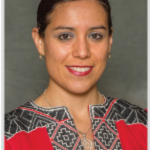Research Scientists
One of the Center’s major goals is to enhance the diversity of the aging research workforce by identifying and mentoring scientists from and/or with interest in underrepresented groups who can advance research on AD and related dementias (ADRD).

Monika Lopez- Anuarbe, PhD
2023 Scientist
Assistant Professor
Economics
Connecticut College
Project title: The Economic Healthcare Costs of ADRD for Mexicans and Mexican Americans in México and the U.S.
Abstract: Sub-populations in México and the United States, including residents in rural areas, are experiencing higher likelihood, incidence, and prevalence of Alzheimer’s disease and related dementias (ADRD) (Alzheimer’s Association, 2022; Mejía-Arango et al, 2021). Other groups in these countries are not. Regardless of such diseases’ growth trends, the economic healthcare costs (financial and otherwise, including implicit non-remunerated caregiving costs) and expenses for individuals with ADRD and their families are significant and vary based on personal, locational and structural circumstances. The present study seeks to better understand the patterns of these economic healthcare costs for Mexicans living in their country as a majority population, compared to being a majority-minority (i.e. an ethnic minority outnumbering the majority or White population) or a minority group in the United States. I would like to study how personal characteristics, geographical region, birthplace, and majority/minority status affect these economic healthcare costs. Mexico and the United States share a common past and present, including a historically evolving border, but also vary significantly in their world positionality, health care system structures, and chronic condition patterns. To the best of my knowledge, there are no other studies explicitly comparing these economic healthcare costs for Mexicans residing in México, born in the United States (Mexican Americans) or migrating to the United States.

Dana Alhasan, PhD
2023 Scientist
Assistant Professor
Public Health Sciences
University of North Carolina
Project title: Arab Americans Perception of their Neighborhood Environment in relation to Alzheimer’s Disease and Related Dementias Risk
Abstract: The prevalence of Alzheimer’s disease and related dementias (ADRD) is growing among older adults (Barnes & Yaffe, 2011) and disproportionately impacts Arab Americans compared to White adults (Dallo & Kindratt, 2011). Modifiable features of the neighborhood environment may be an important contributor to ADRD and thus essential to understand their influence on ADRD among diverse populations (Wu, Prina, & Brayne, 2019). However, it remains unclear how Arab Americans perceive their neighborhood environment, particularly in relation to ADRD risk. Commonly used measures in neighborhood research (e.g., neighborhood social cohesion scale adapted from the Project on Human Development in Chicago Neighborhoods) may be limited in capturing components of the neighborhood environment relevant to different racial/ethnic groups. Given the lack of racial/ethnic diversity in the scientific literature, we aim to fill this gap by understanding the experience of Arab Americans in their neighborhood environment in relation to perceived risk of ADRD. Using the Michigan Center for Contextual Factors in Alzheimer’s Disease Research Volunteer Directories, we will conduct focus groups by using a background questionnaire and semi-structured guiding questions.

Maria V Roche-Dean, PhD, RN
2023 Scientist
Assistant Professor
Bronson School of Nursing
Western Michigan University
Project title: Awareness of Cognitive Impairment and Links in Care Network Characteristics
Abstract: Providing timely dementia diagnosis has been recommended to decrease health disparities especially among non-Hispanic Black and Hispanic older adults (Lin et al., 2020). However, ADRD research reveals persistent lack of awareness or underdiagnosis of dementia in these populations (Amjad et al., 2018; Rote et al., 2021). Delayed dementia diagnoses have led to treatment at later stages when cognitive impairment is more severe. Such delays prevented the person living with dementia from participating in care decisions, including planning for the future with family or significant others (Rasmussen et al., 2019). In this study, we investigate links between awareness of cognitive impairment and characteristics of the care network using the National Health and Aging Trends Study data set (NHATS).

Cindy Tsotsoros, PhD
2022 Scientist
Assistant Professor
Human Development and Family Studies
The University of Rhode Island
Project title: The Impact Adverse Childhood Experiences and Aging has on Brain Health in Latina Women
Abstract: Aging is the number one risk factor for cognitive decline and Alzheimer’s Disease and Related Dementias (ADRD); however, decline in old age may reflect experiences over the entire lifespan. Prior research shows how early-life experiences, such as education, have an influence on late-life cognitive performance and old-age or ADRD cognitive trajectories. Additional early-life factors that may exacerbate neurocognitive degeneration or ADRD risk include adverse childhood experiences (ACEs). An often unconsidered harm of ACEs is the potential risk it poses to brain development and later-life cognitive impairment. ACEs are defined as traumatic childhood events. Notably, historically discriminated groups are disproportionally harmed by the influence of ACEs. In light of the pandemic, health disparities, including ACEs were further exemplified among marginalized communities. Nationally, Latinos are 51% more likely to experience ACEs than their non-latino counterparts. Findings linking ACE exposure to future brain health and disease is concerning given the high prevalence of ACEs. Brain derived neurotrophic factors (BDNF) are also linked to brain and cognitive health, with evidence that aging and neurological diseases reduce the levels of BDNF. Low levels of BDNF in women have been linked to cognitive impairments, depression, and Alzheimer’s disease; however, direct connections between cognitive function and BDNF have yet to be examined. It is unknown how levels of BDNF are impacted by aging and traumatic experiences or how they relate to cognitive testing. Thus, in order to disentangle the contribution of age and ACEs on brain health, it is essential to determine whether ACE-related patterns of cognitive deficits are detectable on neuropsychological testing and whether they relate to BDNF levels among age cohorts with and without trauma history. Such data will help us understand the relationship between performance-based vs. biologic indicators of brain function across ages. To begin to fill this knowledge gap, the proposed study will leverage findings from an ongoing study of ACEs and neurotrophins in a primarily white sample to address the following aims: Aim 1: To define cognitive performance across the emerging and older adult cohorts stratified by ACEs, and Aim 2: To define BDNF levels across the two age cohorts stratified by ACEs. Using an observational cohort design, 100 Latinas―50 emerging and 50 older adults―will be recruited. Independent groups will be matched by exposure to ACEs and other key covariates (e.g., education). Participant’s eligibility will be assessed via an online screening questionnaire where eligibility criteria will be confirmed. Those eligible and willing to participate will be invited to enroll in the study. Enrolled participants will have blood drawn prior to completing a computer based cognitive assessment (ANAM and NIH-Toolbox CB). This study is an innovative investigation that will have important public health implications with the ability to identify novel risk factors (e.g., neurocognitive profiles and/or brain substrates) as intervention targets to protect brain health and to promote healthy aging across the lifespan among Latinas.

Darlingtina Esiaka, PhD, CPG, CPH
2022 Scientist
Postdoctoral Researcher
Biomedical Sciences
Rutgers University
Project title: Exploring The Pathways to Alzheimer’s Disease in Older African American Men
Abstract: Past studies done primarily in white Americans report that men have a higher risk of mild
cognitive impairment (MCI) and more rapid progression from MCI to AD. We do not know if this is also the
case for African American men. In particular, there is a paucity of neuroimaging data on older African
American men in the years prior to, and during, cognitive decline to AD. This has led to a knowledge gap that
hinders our ability to detect and prevent AD in African American men, addressing a key racial and gender
health disparity. My proposed research will utilize baseline observational studies in older, cognitively healthy,
urban African American men to examine markers of future AD/RD risk.

Erin Bouldin, PhD, MPH
2022 Scientist
Assistant Professor
Department of Internal Medicine
University of Utah
Project title: The Impact of Home- and Community-Based Services on Function, Quality of Life, and Long-Term Institutionalization among Diverse Older Adults with Dementia and Burden among their Family Caregivers
Abstract: Alzheimer’s disease and related dementias (ADRD) impact the health and quality of life of millions of
Americans, and ADRD prevalence is growing. Family members and friends caring for people with ADRD
provide many hours of care and assistance, enabling people with ADRD to live in the community. Health
disparities exist by race and ethnicity in ADRD prevalence and treatment and caregiver experiences, including
burden, vary across race and ethnic groups. Home- and community-based services (HCBS) are a broad range
of programs designed to support people living with disabilities or health conditions and their caregivers where
they live. HCBS have the potential to improve the health and quality of life of people living with ADRD; reduce
burden among caregivers; and prevent or delay institutional care for people living with ADRD. However, it is
still not clear whether or under what conditions HCBS result in improved outcomes, especially among people
from diverse racial and ethnic backgrounds. The aims of this project are to assess whether HCBS use is
associated with improved outcomes for people living with ADRD and their caregivers, whether there are
differences in the relationship between HCBS use and outcomes by race and ethnicity, and whether particular
types or combinations of HCBS are most strongly associated with better outcomes for people with ADRD and
their caregivers. This proposal will utilize data from the National Health and Aging Trends study, the associated
National Study of Caregiving, and linked HCBS utilization data from Medicaid and Medicare to achieve the
aims. This project will lay the foundation for future work that identifies preferences for HCBS among diverse
people with ADRD and their caregivers and develops acceptable and effective HCBS programs and policies.
The project focuses on epidemiology, one of MCCFAD’s core areas.

Hala Darwish, PhD, APN, RN, FAAN
2022 Scientist
Associate Professor
School of Nursing
University of Michigan
Project title: A Pilot Randomized Controlled Trial of A Comprehensive Cognitive and Affective Intervention for Mild Cognitive Impairment (MCI) (CoINTEGRATE- For Foreign-Born Arab Americans- a dyadic approach)
Abstract: Cognitive and affective dysfunctions are challenging clinical characteristics of neurocognitive disorders, like Mild Cognitive Impairment (MCI) and Alzheimer’s Disease (AD). The annual prevalence for MCI due to AD is 22.7% in adults older than 60. These rates increase with aging. In the US, the number of people with MCI will increase from 12.23 million in 2020 to 21.55 million in 2060 [1]. Around 16% of adults with MCI develop AD in around 2.5 years from diagnosis, with an annual conversion rate of 3-10%.[2]. Among foreign-born Arab Americans, AD and related dementia (ADRD) prevalence was estimated at 10.3% compared to 7.5% US-born non-Hispanic white Americans, blacks, and Asians. Foreign-born Arab Americans (FBAA) were 1.4 times more likely to have ADRD than US-born adults[3]. To our knowledge, data on rates of MCI among FBAA is lacking. In addition to the cognitive deficits, persons with MCI and AD suffer from affective changes. Such cognitive and affective dysfunctions are often simultaneously present and adversely impact the patients’ community integration (CI) and financial situation, and contribute to poorer health-related quality of life (HRQoL). Due to its complexity, it is common to examine and treat such dysfunctions separately; however, they are mutually associated [4-9]. Hence, implementing separate interventions does not always translate into improved patient functional outcomes [10]. Informal caregivers such as family and friends provided around $257 billion in unpaid care to people living with ADRD in 2020 [11]. Among 769 caregivers of adults with MCI, 24.6% reported depressed mood[12]. Little is known about Arab-Americans with MCI and their caregivers’ cognitive and affective characteristics. Ajrouch and colleagues suggested that the scarcity of cognitive assessment batteries in Arabic might have contributed to this limited information about this subgroup of adults [13, 14]. We had developed, culturally adapted, and explored the psychometric properties of well-established cognitive and affective assessment tools in Arabic and generated the normative values [15-18] in Lebanon. Given the high prevalence of ADRD among foreign-born Arab Americans and the likelihood of becoming a burden if not well understood, we propose the following study. The Co-INTEGRATE we propose in this pilot study combines cognitive-behavioral and rehabilitation therapies (CRT+CBT) and modifiable lifestyle factors to address the cognitive and affective dysfunctions associated with MCI using a dyadic approach to improve the HRQoL in persons with MCI and their caregivers. Using culturally valid and rigorous cognitive assessment tests in English/Arabic, we will measure and characterize the cognitive performance of foreign-born Arab Americans. We will also explore the dyads’ social determinants of cognitive/affective health and quality of life. The purpose of this pilot is 1) to examine the feasibility of comprehensive multimodal individually tailored CRT+CBT sessions on community integration and QoL and 2) to examine the determinants of the quality of life of foreign-born Arab Americans with MCI and their caregivers. We hypothesize that combining evidence-based cognitive and affective therapies (CRT+CBT) with lifestyle modifications is feasible and will improve the cognitive performance and QoL in patients with MCI and their caregivers compared to CRT or usual care (30 min psychoeducation sessions).

Linda Sayed, PhD
2021 Scientist
Assistant Professor
James Madison College
Michigan State University
Project title: The Psychosocial Impact of COVID-19 on Aging Arab American
Abstract: Arab Americans make up nearly 30% of Dearborn, Michigan, comprising the most concentrated Arab population in the United States (U.S. Census Bureau, 2000). Considered the 3rd largest ethnic population in the state of Michigan, this group continues to remain invisible in aging research (Salari, 2002). The lack of research on the experiences of Arab immigrants and descendants residing in the United States is largely due to their official categorization as white on the U.S. Census. In the United States, Alzheimer’s Disease and Related Dementias (ADRD) afflict 5.8 million individuals over the age of 65 (Dallo & Kindratt, 2019). Given that most studies on ADRD focus on a comparison between minorities and whites, illness afflicting Arab Americans, in particular, have been little studied given that they are categorized as a subgroup of whites (Gualtieri, 2009; Ajrouch et al., 2017). The objective of this project is to determine the impact of COVID-19 on the cognitive and brain aging of Arab Americans in the Metro-Detroit area. The central hypothesis is that aging Arab Americans, particularly recent immigrants and refugees, have been negatively impacted during the COVID-19 pandemic due to the breakdown of various support systems and sociopolitical factors that shape their experiences in the U.S. The restriction of familial interactions taken as mitigation measures to reduce the spread of the virus coupled with limited social and health services has negatively affected aging Arab refugees and immigrants and left them with limited resources. The societal and familial changes brought about by COVID speak to the need to incorporate greater focus on ethnic and cultural factors in the analysis of cognitive aging particularly for refugee and immigrant communities whose experiences are shaped by sociopolitical factors both prior and after their arrival to the United States. Arab American immigrants and refugees are most impacted when familial and institutional support systems and resources are no longer made available. The proposed research will contribute to understanding the social experiences of aging Arab refugees and immigrants which is critical to designing the most effective quality intervention.

Helen C.S. Meier, PhD
2021 Scientist
Assistant Research Scientist
Population, Neurodevelopment and Genetics Program
Institute for Social Research
University of Michigan
Project Title: Metals exposure and risk of cognitive decline and ADRD in the Sacramento Area Latino Study on Aging.
Abstract:Alzheimer’s disease and related dementias (ADRD) are a growing public health burden with an estimated 5.8 million Americans living with Alzheimer’s currently; this number is expected to grow to 14 million by 2050. Alzheimer’s is the 6th leading cause of death in the US and 1 in 3 seniors dies with Alzheimer’s or other dementia. Communities of color are disproportionally affected by ADRD compared to non-Hispanic whites. Latinos have a higher risk of ADRD and acquire the disease 7 years earlier, on average, than non-Hispanic whites. This health disparity will likely intensify as the US Hispanic population over 65 years is predicted to grow from 4 million in 2016 to 19.9 million in 2060. To address this health inequality, there is an urgent need to understand contextual factors that may put Latino elders at a disproportionately higher risk of cognitive impairment, decline and ADRD in the US. Environmental exposures, such as metals, are of interest as contextual factors contributing to ADRD due to their known neurotoxic effects, particularly in early life. This study will use data from four waves of the Sacramento Latino Study on Aging (SALSA), where the blood concentration of eight individual metals (non-essential: lead, cadmium, mercury, arsenic and essential: iron, selenium, copper, zinc) are currently being measured via mass spectrometry, and link this information to existing survey data to estimate the association between these metals and cognitive decline and ADRD incidence in a sample of 1,027 Latino elders. We hypothesize that altered levels of non-essential metals will be socioeconomically patterned in this cohort. We also hypothesize that Latino elders with higher concentrations of non-essential metals will have greater cognitive decline and higher risk of ADRD incidence than those with lower concentrations of nonessential metals.

Ronica Rooks, PhD
2021 Scientist
Associate Professor
Department of Health and Behavioral Sciences
College of Liberal Arts and Sciences
University of Colorado Denver
Project Title: Late-life Work Engagement and Dementia in the Health, Aging, and Body Composition Study.
Abstract: As the US’ population continues aging with longer life expectancies and delayed retirement, more older adults will likely work with cognitive impairments and mild dementia (Carr et al., 2020; Egdell et al., 2018; Silvaggi, Leonardi, et al., 2020). Qualitative research on middle-aged and older adults working with dementia in the United Kingdom shows working helps many cope with their diagnosis, manage their symptoms, stay connected with their social networks and maintain continuity in their lives when other things are changing (Ritchie et al., 2018). Research on those aged 50-65 with early onset dementia in an Australian work-site intervention program used work-buddies, daily debriefings, journaling and socialization, finding improved worker satisfaction and self-esteem (Silvaggi, Leonardi, et al., 2020). But, little research addresses the work experiences of older adults with ADRD (Silvaggi, Leonardi, et al., 2020). Research on racial disparities in the relationship between working and dementia, examining longitudinal data in the Health, Aging, and Body Composition (HABC) study, will fill this gap. This study’s public health relevance is to build evidence-based, contextual dementia research focused on reducing older Black adults’ dementia burden through working, leading to an NIA grant proposal on research to mitigate cognitive declines and ADRD via productive activities.

Ketlyne Sol, PhD
2021 Scientist
Clinical Psychologist
Research Investigator
Social Environment and Health Program
Institute for Social Research
University of Michigan
Project Title: Risk and resilience mechanisms underlying race disparities in ADRD: An examination of neighborhood resources, brain integrity, and cognition
Abstract: The mechanisms and moderators underlying race disparities in Alzheimer’s disease and related dementias (ADRD) are understudied. These disparities may, in part, be due to racial differences in available neighborhood resources. The presence of these resources may contribute to brain and cognitive health in older adulthood. This study’s overall goal is to clarify risk and resilience mechanisms underlying race disparities in ADRD by: 1) Determining whether racial differences in neighborhood resources contribute to racial disparities in cognitive function and 2) Characterizing the role of brain integrity in associations between neighborhood resources and cognition. The research plan will leverage primary data collection efforts of the Michigan Cognitive Aging Project, which is a regionally-representative cohort study of older adults in Southeastern Michigan. This pilot grant will also facilitate the training and professional development of a junior scientist to accelerate the applicant’s trajectory towards ADRD research independence with a strong mentorship team at the University of Michigan. The mentorship team will provide expertise in cognitive aging, neuroimaging, geospatial analysis, and ADRD race disparities. The proposed research directly addresses the MADC’s goal of promoting research that identifies, furthers understanding of, and modulates the numerous non-β-amyloid factors that contribute to brain dysfunction and neurodegeneration.
 2020 AD-RCMAR Research Scientists:
2020 AD-RCMAR Research Scientists:

Elizabeth Muñoz, PhD
2020 Scientist
Assistant Professor
Department of Human Development and Family Sciences
University of Texas at Austin
Abstract: The primary goal of this research is to develop a comprehensive multi-domain profile of psychosocial stress in a racially and ethnically diverse sample of adults and investigate how these are related to cognitive status and variability. Guided by propositions from the life span (Glymour & Manly, 2008) and epidemiology literature (Martikainen et al., 2002), I propose that psychosocial stress across domains clusters in distinct profiles that are linked with cognitive health through biological and behavioral mechanisms. Further, because cognitive decline may begin before old age, during midlife (Hughes et al., 2018), I propose an analysis in a diverse sample from midlife to older adults that incorporates multi-domain assessments of psychosocial stress to address the following aims:
Aim 1. To evaluate the hypothesis that there will be distinct psychosocial stress profiles that will distinguish racial and ethnic minorities from their counterparts.
Aim 2: To test the hypothesis that high-risk psychosocial stress profiles will be associated with lower cognitive function, and with greater cognitive variability. 2a: Test the hypothesis that high-risk psychosocial stress profiles will be associated with greater variability of cognitive performance within and across measurement bursts.
Aim 3: Test the hypothesis that the observed associations between stress profiles and cognitive status and variability are mediated by daily experiences and biological correlates of stress.
 Tiffany Kindratt, PhD
Tiffany Kindratt, PhD
2020 Scientist
Assistant Professor
Public Health Program
College of Nursing and Health Innovation
University of Texas at Arlington
Abstract: The increasing incidence and prevalence of ADRD and comorbid diabetes, in addition to the cognitive challenges that ADRD presents to appropriate diabetes monitoring and treatment, represents a serious barrier for patients to adhere to recommended standards of care. Adults with ADRD and comorbid diabetes may be less able to adhere to monitoring and treatment recommendations and less confident in their abilities to take care of their diabetes. Adults with ADRD and comorbid diabetes place a greater burden on caregivers than adults with ADRD alone. This presents a greater challenge for clinicians to provide recommended treatment and monitoring plans in collaboration with patients and caregivers. By identifying the prevalence of and adherence to standards of care on a national level, we can begin to examine ways to create policies and design interventions to reduce these challenges. Two innovative features of this study include: 1) a focus on diabetes care management among adults with ADRD and comorbid diabetes 2) a unique methodology designed to unmask Arab American health disparities using linked National Health Interview Survey (NHIS) and Medical Expenditure Panel Survey (MEPS) data. First, there is a gap in the literature on studies evaluating diabetes care treatment, monitoring, and self-efficacy among adults with ADRD and comorbid diabetes using nationally representative samples. This gap in the literature represents a significant barrier in our ability to provide patient- and family-centered care from providers, based on patient and caregiver perspectives. Second, by linking these two data sources, we can determine nationally representative estimates of ADRD and comorbid diabetes and adherence to standards of care among Arab American. This new method represents an innovative approach to uncover Arab American health disparities.
 Sandra P. Arévalo, PhD
Sandra P. Arévalo, PhD
2020 Scientist
Assistant Professor
Human Development
College of Liberal Arts
California State University, Long Beach
Abstract: The main objective of this study is to assess the needs and stressors affecting young adult Latino caregivers. This is an important research undertaking because young adults are at a critical developmental stage and most caregiver research, designed for the older caregiver population, may not capture the specific needs of this group. Using Pearlin’s Alzheimer’s caregivers’ stress framework, this study will model the multifactorial components promoting young adult Latino caregiver burdens that may contribute to the increase in stress, interfere with normal development, and ultimately increase mental and physical health disparities in Latinos. To reach young Latino caregivers, we will collect survey data from undergraduates attending, a large, public, urban university. This study goes beyond existing caregiver research focused on older predominantly NLW caregivers by collecting data from younger caregivers, i.e., 18-34 years of age, from an ethnically diverse public urban university, i.e., CSULB student population: 42.9% Latino, 22.3% Asian, 16.7% white, 4.78% two or more races, 3.6% Black, 6.2% non-resident aliens. Specific aims are to:
Aim 1: Characterize the prevalence and features of university undergraduates with current or previous caregiving responsibilities of a person with ADRD. Randomly selected instructors will be invited to share 5-10 minutes of class time to recruit participants; participants will also be recruited across public space on campus.
Aim 2: Examine cross-sectional associations between caregiver burdens and care intensity and young adult’s development and health outcomes in Latino caregivers.
Aim 3: Characterize qualitatively the influence of culture and community context on knowledge, beliefs, and behaviors on caregiving practices and quality of life of both Latino care- givers and -recipients.
 2019 AD-RCMAR Research Scientists:
2019 AD-RCMAR Research Scientists:
 Erica Diminich, PhD
Erica Diminich, PhD
2019 Scientist
Research Assistant Professor
Program in Public Health
Stony Brook University School of Medicine
Study Title: Identifying Risk Factors for Cognitive Impairment in Latinos: A Population Based Pilot Study of Biomarkers, Emotion and Stress
This pilot study will address a critical need to characterize plasma biomarkers of neuropathological change and pre-clinical AD-plasma biomarkers in a non-clinical sample of Latinos at mid-life. This work will also provide 1) preliminary evidence to assess the acceptability, feasibility and potential limitations in recruiting, engaging and retaining Latino participants in AD research involving venipuncture, and computer based assessments; 2) advance understanding of how chronic stress and risk factors identified in this application potentially influence neuropathological changes; 3) examine potential moderating effects of emotion and psychosocial functioning.
 Marc A. Garcia, PhD
Marc A. Garcia, PhD
2019 Scientist
Assistant Professor
Sociology & Institute for Ethnic Studies
University of Nebraska – Lincoln
Study Title: Age of Migration and Cognition: The Importance of Contextual Factors in Cognitive Aging Among Older Latinos in the United States.
The goal of this research is to identify potential mechanisms and multifactorial processes underlying the pathways that create and sustain cognitive health disparities among older Latino populations. Currently, there are no available empirical studies that use a nationally representative sample to identify cognitive decline, cognitive impairment, and Alzheimer’s dementias among Latinos by age of migration and contextual factors. Prior research investigating cognitive outcomes have examined older Latinos as a monolithic group or have been limited to regional studies which focused on specific Latino populations. Thus, there is a critical need to examine the demographic diversity within the older Latino population to identify cognitive risk profiles by nativity status, age of migration, and environmental risk factors. This project will examine these disparities to better understand how underlying factors (i.e. gender and race/ethnicity), nativity status (i.e. foreign-born, age of migration), socioeconomic factors (i.e. education, income, and occupation), psychosocial factors (i.e. social support and depressive symptoms), behavioral factors (i.e. obesity, physical inactivity, smoking, alcohol consumption), physical factors (i.e. morbidity, physical functioning, and disability), and environmental factors (i.e. social/physical environment) contribute to heterogeneous cognitive health disparities among older Latinos. I will accomplish this through three aims: Aim 1: Investigate population-level trends in cognitively unimpaired, cognitive impairment no dementia (CIND), and dementia life expectancies among older Latinos by nativity and age of migration to the US. Aim 2: Evaluate population-level trends in cognitive decline among older Latinos by nativity and age of migration to the US. Aim 3: Investigate population-levels in the prevalence of CIND and dementia among older Latinos by nativity and age of migration to the US.
 Salim Hayek, MD
Salim Hayek, MD
2019 Scientist
Assistant Professor, Medicine Cardiology
University of Michigan
Study Title: Using a “SuPAR” Biomarker to Evaluate the Burden of Inflammation and Its Impact on the Ethnoracial Differences in Cognitive Decline.
Inflammation is increasingly recognized as a major component of the pathogenesis of Alzheimer’s disease (AD). While numerous epidemiological studies suggest that use of anti-inflammatory drugs is associated with a lower incidence of AD, clinical trials have been largely disappointing. Peripheral biomarkers of inflammation may identify a subgroup of AD patients that could benefit from anti-inflammatory therapy. Moreover, differences in inflammatory burden may account for ethnoracial differences in the prevalence and progression of AD. Characterizing the burden of inflammation in AD is however challenging, and the association of traditional blood-based measures of inflammation with AD and cognitive decline has been inconsistent. We propose characterizing levels of soluble urokinase plasminogen activator receptor (suPAR) – a novel marker of chronic immune activation – in patients with AD, determine whether levels can predict declining cognitive function, and assess whether differences in the burden of inflammation accounts for ethnoracial differences in cognitive decline.
 2018 AD-RCMAR Research Scientists:
2018 AD-RCMAR Research Scientists:
 Danielle L. Beatty Moody, PhD
Danielle L. Beatty Moody, PhD
2018 Scientist
Associate Professor
Department of Psychology
University of Maryland, Baltimore County
Study Title: Early Life Adversity and Cognitive Decline in Middle-Aged to Older African Americans in HANDLS
This project will be the first to comprehensively investigate early life adversity (ELA; e.g., childhood socioeconomic status [CSES], MIDUS childhood context indicators, & Adverse Childhood Experiences [ACEs]) in relation to cognitive decline in middle-aged to older urban-dwelling, African American adults, without neurological disease. Use of prospective data on multiple cognitive outcomes among African Americans in this age range represents a major advantage of the NIH-funded Healthy Aging in Neighborhoods of Diversity across the Life Span (HANDLS) study in comparison to other studies, allowing us to detail these associations more extensively. This pilot project will allow for initial exploration of these linkages, in preparation for a R01 that will aim to elucidate biopsychosocial mechanisms underlying the relation of ELA to cognitive decline among African Americans. The Specific Aims of this project are, Aim 1: Determine whether greater ELA is associated with decline in cognitive functioning among African Americans. ELA in childhood will be assessed by CSES, MIDUS indicators, and ACEs. Cognitive functioning will be assessed by neurocognitive tests of verbal and nonverbal learning and memory, attention, working memory, visuospatial skills, psychomotor speed, and executive function. We hypothesize that greater ELA in childhood will be associated with greater decline in these endpoints over follow-up, independent of adult SES and key sociodemographic, psychosocial, and behavioral adjustment variables. Aim 2: Determine whether cardiometabolic risk factors serve as mediators of the relation of ELA in childhood to decline in cognitive functioning among African Americans. A cardiometabolic risk factor composite will be comprised of blood pressure, body mass index, total cholesterol, glucose, insulin, and CRP. We hypothesize that greater cardiometabolic risk will partially account for the relation of ELA in childhood to cognitive endpoints in adulthood (outlined in Aim #1). Overall, this project may promote greater understanding of the role ELA plays in the earlier onset of poorer cognitive functioning among African Americans.
 Laura Y. Cabrera, PhD
Laura Y. Cabrera, PhD
2018 Scientist
Assistant Professor, Neuroethics
Michigan State University
Study Title: Latinos Perceptions and Concerns about Alzheimer’s Disease
Increasing evidence highlights the role of individual and cultural values in the experience of caregiving challenges (Sherman, Webster and Antonucci, 2013; Nápoles et al., 2010). As such, are the expectations and burdens of caregivers the same across Latino groups? It is recognized that beliefs surrounding memory loss and AD caregiving vary across racial/ethnic groups; such variability affects the level and type of interaction between patients, families, and the healthcare system (Janevic & Connell, 2001; Roberts et al., 2003). However, are there ethnically distinct interactions among Latino groups? How might the acceptability of AD intervention and related efficacy vary across Latino groups? As part of the MCCFAD, we will explore, in a systematic and culturally sensitive fashion, levels of familiarity with symptoms associated with AD, diagnosis and care, and perceptions and concerns about AD, as well as barriers to care among Mexican and Puerto Rican, the predominant -Latino groups in the Grand Rapids, Michigan region.
Specific Aim 1: Examine perceptions and concerns about AD symptoms, diagnosis, and care among Mexicans and Puerto Ricans in the Grand Rapids region.
Our main objective is to identify and assess perceptions and concerns regarding AD symptoms, diagnosis and care in the two identified Latino groups.
We held five Focus Groups (three with Mexicans, and two with Puerto Ricans), as well as two interviews with Puerto Ricans participants employing open-ended questions about AD, predictive testing, diagnosis, progression of disease and care. Focus Group interview guide was first discussed with a community advisory board, composed of Latino community leaders, to develop a cultural sensitive interview process that takes in consideration social context.
 Florence Dallo, PhD, MPH
Florence Dallo, PhD, MPH2018 Scientist
Chair and Associate Professor, Department of Public and Environmental Wellness
School of Health Sciences
Oakland University
Study Title: The Epidemiology of Alzheimer’s Disease and Related Dementias (ADRD) among Arab Americans Compared to non-Hispanic whites (NHW), non-Hispanic blacks (NHB), Hispanics, and Asian Americans in the US and Michigan
Study Purpose: The overall goal of the study is to understand the epidemiology, specifically prevalence
and risk factors for and mortality related to ADRD among Arab Americans ages 45 and older compared
to non-Hispanic whites, non-Hispanic blacks, Hispanic and Asian Americans. The three specific aims are
to: 1) Estimate the national prevalence of and risk factors for ADRD using US Census and National Health
Interview Survey data; and 2) Estimate ADRD-specific mortality rates using data from the Michigan
Department of Health and Human Services using a surname list.
Methods: For aim 1, percents and odds ratios were calculated. For aim 2, we will use an Arab name
algorithm that uses first, last, and maiden name, along with standard race and ethnicity variables to
identify Arab Americans use state data. We will calculate death rates. The data base will be de-identified
prior to data analysis.
Summary of Results to Date: Arab Americans are more likely to have ADRD compared to other groups (10.3% for Arab Americans; ~ 7.5% for US-born non-Hispanic whites, blacks and Asians; and 8.6% for Hispanics). Also, Arab Americans are 1.4 times more likely to have ADRD compared to US-born non-Hispanic whites when controlling for other factors.

